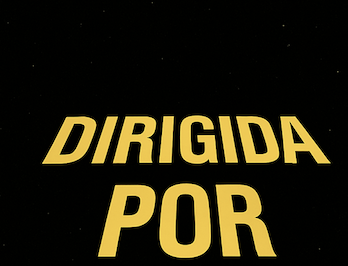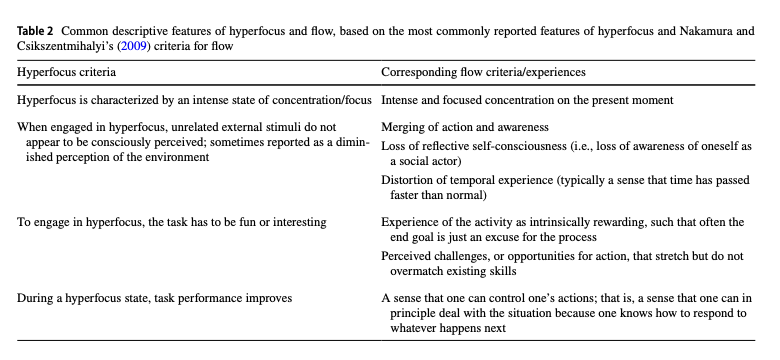Hyperfocus: A Short Guide
1. What is hyperfocus?
Hyperfocus is an intense state of concentration where you're “locked in.”
It’s moderately correlated with ADHD (r = 0.53), but it’s not exclusive to ADHD.
When it hits, you lose track of time, tune out your surroundings, and can keep working well past what’s healthy or productive (“I forgot to eat”).
It can manifest as an inability to direct your attention elsewhere. You might get great results… or pour hours into something meaningless.
In theory it’s open to everyone.
2. Do we see it with our clients? What does it look like?
Sure. Some of them.
They will vanish into single-task tunnels. Some are nominally productive - coding a stats project for hours, getting obsessed with a Gatsby essay that you write it all in one go.
Other times less so. We had a client make a video project for Spanish. He spent 7 hours getting the credit sequence right. (He wanted it to look like Star Wars.)
It often comes with high opportunity costs: the focus isn’t usually directed at high-ROI or goal-aligned tasks. One client was telling us about how he researched phishing-email schemes for hours instead of studying for a chemistry test that he had the next day.
When the spell breaks, they’re often surprised to find hours have disappeared.
3. How is it measured?
The main instrument is the AHQ-D, which asks about things like forgetting to eat, losing track of time, or drowning in small details:
Scores on the AHQ-D correlate with ADHD traits but capture a distinct attentional pattern—deep over-absorption.
It’s not widely validated yet for adolescents.
4. How is hyperfocus different from flow?
This is a scholarly food fight!
Some researchers (Ashinoff & Abu-Akel) argue they’re the same phenomenon - “flow” comes from positive psychology literature, “hyperfocus” from psychiatry literature. Here’s their table:
But the tools tell a different story. Hupfeld et al found only a 0.12 between flow and hyperfocus, which is tiny if they’re measuring the same thing. The authors write:
“That is, both involve intense focus on an activity, but flow is typically considered to be more of a productive or “peak”/“optimal” experience whereas HF may have positive (e.g., completing a creative project) or negative/neutral outcomes (e.g., watching many hours of television).”
I think this seems reasonable. Flow feels good: you’re in control, performing well, and fully aligned. Hyperfocus can feel good, but sometimes is something closer to a trap, according to our clients. They can’t get out.
5. How does this relate to executive function coaching?
We try to observe and not pathologize hyperfocus. Sometimes we cheerlead it! If it’s a problem, we have different techniques for pulling kids out of it that are customized to the kid.
We often reframe it for parents, especially when they’re baffled: “He’s so interested in [X], but I can’t get him to do anything else.”
We’re reluctant to extinguish a fire that could be productive. But we balance it with other factors: grades, long-term goals, time budgeting. On average, we try to appreciate and redirect it.
6. Which fictional characters are famous for it? Athletes? Authors?
I asked around and Sherlock Holmes came back in many responses.
MJ and Kobe were famously able to lock in for extended stretches.
To me, Marcel Proust is the single greatest hyper-focuser I’ve come across. This is only a FRACTION of what he says about some hawthorns:
I found the whole path throbbing with the fragrance of hawthorn-blossom. The hedge resembled a series of chapels, whose walls were no longer visible under the mountains of flowers that were heaped upon their altars; while underneath, the sun cast a square of light upon the ground, as though it had shone in upon them through a window; the scent that swept out over me from them was as rich, and as circumscribed in its range, as though I had been standing before the Lady-altar, But it was in vain that I lingered before the hawthorns, to breathe in, to marshal before my mind (which knew not what to make of it), to lose in order to rediscover their invisible and unchanging odour, to absorb myself in the rhythm which disposed their flowers here and there with the light-heartedness of youth, and at intervals as unexpected as certain intervals of music; they offered me an indefinite continuation of the same charm, in an inexhaustible profusion, but without letting me delve into it any more deeply, like those melodies which one can play over a hundred times in succession without coming any nearer to their secret
Shout out to my guy Marcel, forever.



